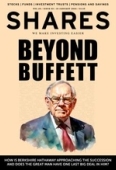Archived article
Please note that tax, investment, pension and ISA rules can change and the information and any views contained in this article may now be inaccurate.
Should investors be concerned by Fundsmith Equity's five year underperformance?

Terry Smith delivered disappointing news last week (9 January) after he revealed his flagship equity fund Fundsmith Equity Fund (B41YBW7) had underperformed the MSCI World Index for a third successive year.
Moreover, the fund’s cumulative total return now lags the global benchmark over five years.
As Smith points out in his annual letter, outperforming the market or even making a positive return every year is not something investors should expect.
So, what should investors do with this news, if anything at all, and how should they think about investment performance in a wider context? This feature introduces and analyses some key pointers.
Looking through a long-term lens Fundsmith has been an unmitigated success story.
Since inception in November 2010, the fund has handily beaten the index by delivering an annualised total return of 15.3% per year which means Smith has turned a £1,000 investment into almost £6,500 today.
The fund remains the best performer since inception among the 165 funds which sit in the Investment Association Global sector.
Not only has the fund bested the index, it has done so with lower share price variability returning about 63% more than the index per unit of price volatility.
Smith has built a loyal fanbase which has seen the fund’s assets swell to over £24 billion, so converts are unlikely to be too concerned.
As Laith Khalaf, head of investment analysis at AJ Bell points out: ‘All active managers are of course prone to periods of underperformance, especially those like Fundsmith which have a distinct investment style and run a concentrated portfolio. This is especially true when market leadership is as narrow as it was in 2023.’
For new investors considering an investment in the fund the calculus may be slightly different. Some may view the underperformance as an opportunity to get ahead of a potential bounce back to form.
Others may view the soft patch as a red flag which may be enough to prevent them taking the plunge.
The reality is nobody knows how the next five or 10-years will play out. Statistically, past investment performance has no relation to future performance.
WHAT IS SPECIAL ABOUT THREE YEARS?
This begs the question, what is so special about fund managers that they need to prove their worth over one or three years?
As the managers of the Overstone Global Equity Income Fund (FUND:B75K5L9) commented in their recent 2023 review: ‘A year is the time it takes the Earth to complete one orbit around the Sun. Important if you are planting a crop; less so if you are appraising the performance of a long-term investment strategy.’
In 2022, the fund – which like Fundsmith Equity takes a long-term approach and holds a concentrated list of stocks - lagged the benchmark by 20%, whereas last year it beat the index by 17%. ‘Same approach, same process, very different outcomes – simply based on where one anchors a starting point’, add the managers.
Another illustration of the peculiar effects of using fixed dates relates to US investment manager Bill Miller at Legg Mason Capital Management.
Between the early 1990’s and 2000’s, Miller’s fund outperformed the S&P 500 for 10 consecutive years. A book was written on the era called ‘The Man Who Beats the S&P’ by Janet Lowe.
While much was made of this phenomenal run, Miller himself downplayed the result as a quirk of the calendar and pointed out that if the start and end dates been moved by just a few days, his phenomenal winning streak would not have happened.
Interestingly, Fundsmith Equity outperformed the MSCI World Index for 11 consecutive years following launch in November 2010 (ignoring the two months to 31 December 2010).
SUPERINVESTORS
In 1984, Warren Buffett wrote an article for the Columbia Business School magazine Hermes entitled ‘The Superinvestors of Graham-and-Doddsville’.
In it he presented and discussed the investment performance of some of his peers who had been taught by the legendary Benjamín Graham and who all invested using value principles learned from Graham and Dodds’ seminal book ‘Security Analysis’.
Over periods ranging from 13 years to 28 years, the group outperformed the market by between 8% and 17% per year.
To recall, Fundsmith has outperformed the market over the past 13 years by around 4% per year, so these investors performed two times to four times better albeit under very different market conditions and time frames.
What is striking about these superinvestors is that they all suffered significant underperformance at some point along the way to building spectacular long-term track records.
On average, they underperformed around a third of the time they managed money (the range is 7.1% to 42%). The worst three-year underperformance (peak to tough percentage loss) saw one manager fall almost 50% behind the benchmark.
In this regard, Fundsmith Equity compares very well. It has underperformed in only three out of 13 years which is equivalent to 23% of the time.
The fund is around 12% behind the benchmark over three years and around 7% behind over five years according to FE data as of 8 January 2024.
Eugene Shahan, who graduated from the Columbia Business School, wrote an article on Buffett’s findings and his ‘superinvestors’ in 1986.
Shahan observed: ‘In today’s environment, they would have lost many of their clients during their periods of underperformance. Longer term, it would have been the wrong decision to fire any of those money managers.’
Shahan summed up the dilemma well: ‘It may be another of life’s ironies that investors principally concerned with short-term performance may very well achieve it, but at the expense of long-term results.’
EVEN THE EXPERTS GET IT WRONG
Academic studies looking at the investment decisions of pension plan sponsors show that managers tend to get fired after a three-year period of underperformance and hired after strong periods of outperformance.
One study in 2006 by Amit Goyal and Sunil Wahal of the University of Lausanne and Arizona State University concludes: ‘Using a matched sample of firing and hiring decisions, we find that if plan sponsors had stayed with fired investment managers, their excess returns would be larger than those actually delivered by newly hired managers.’
In conclusion, trying to assess the skill of an investment manager by past performance is fraught with jeopardy and generally not the best idea. It is far more important to focus on the investment philosophy adopted and the processes implemented.
DISCLAIMER: AJ Bell referenced in the article owns Shares magazine. The author of this article (Martin Gamble) and the editor (Ian Conway) have an investment in AJ Bell. Ian Conway also has an investment in Fundsmith Equity.
Important information:
These articles are provided by Shares magazine which is published by AJ Bell Media, a part of AJ Bell. Shares is not written by AJ Bell.
Shares is provided for your general information and use and is not a personal recommendation to invest. It is not intended to be relied upon by you in making or not making any investment decisions. The investments referred to in these articles will not be suitable for all investors. If in doubt please seek appropriate independent financial advice.
Investors acting on the information in these articles do so at their own risk and AJ Bell Media and its staff do not accept liability for losses suffered by investors as a result of their investment decisions.
Issue contents
Ask Rachel
Daniel Coatsworth
Feature
- Diversification is key to the streaming service’s success in 2024 and beyond
- How fund managers plan to respond to the artificial intelligence theme in 2024
- Beyond Buffett: How is Berkshire Hathaway approaching the succession and does the great man have one last big deal in him?
- Should investors be concerned by Fundsmith Equity's five year underperformance?
Great Ideas
News
- After a dearth of IPOs last year, 2024 already looks more interesting
- Warpaint shares continue to soar after strong trading update
- Burberry shares hit a new low after second profit warning
- FCA to investigate commission deals in the UK motor finance market
- Why the outcome of a pre-trial hearing could prove good news for GSK
 magazine
magazine








